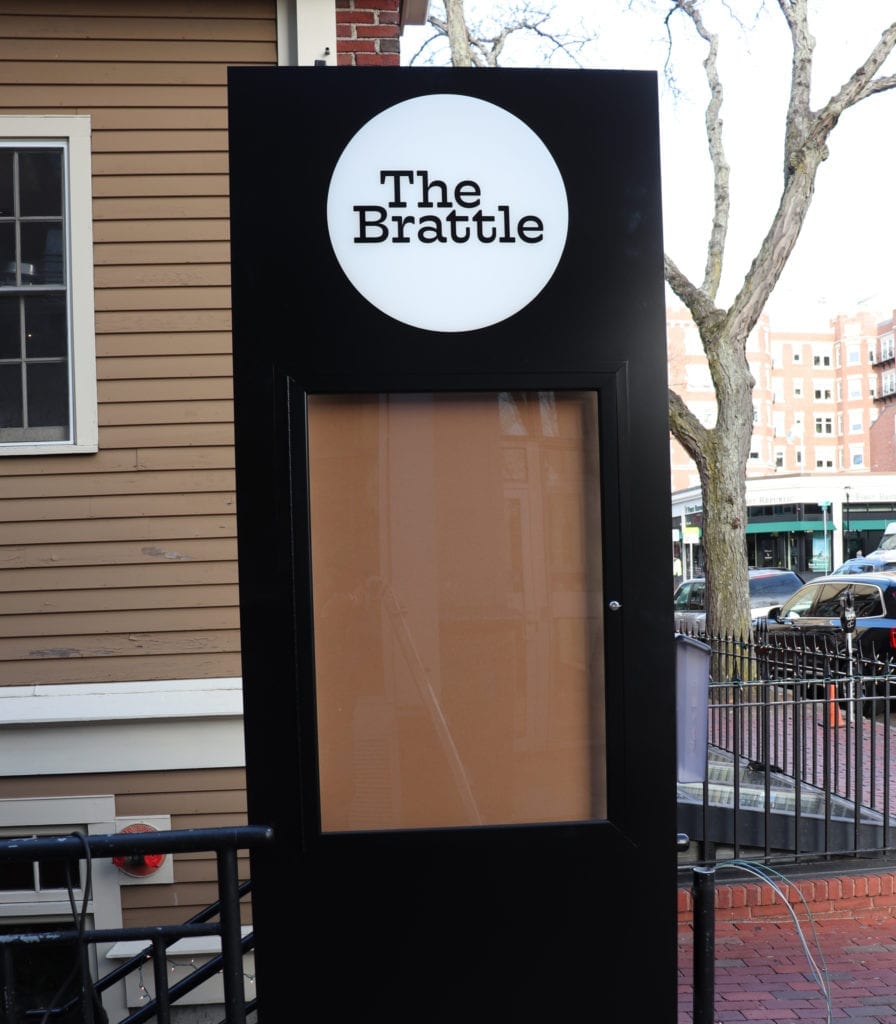
“When this first [began], I turned to Ned and said: If this becomes what I think it’ll become, then I don’t know how the Brattle survives this.”
On Wednesday, March 11, the team at the Brattle Theatre sent their first email regarding the COVID-19 pandemic, announcing expanded cleaning efforts and other preventative measures while also noting that for the time being it would remain “business as usual.” On the morning of Friday, March 13, just before Gov. Baker’s announcement banning public gatherings of more than 250 people in the state of Massachusetts, the team sent another email announcing that attendance would now be capped at 120 per show in accordance with CDC guidelines (on a normal day, the Brattle seats 225). Finally, later Friday night, they sent an email announcing the temporary closure of the space from March 14 through at least April 2.
“We also want you to know that our part-time staff, many of whom rely on The Brattle to make ends meet, will still receive their hourly pay for all shifts they miss during this period,” the email noted. “We are planning on coming back strong once this crisis has calmed down but, as we said in our email yesterday, this is exactly the kind of thing that could threaten The Brattle’s future, as well as the future of any arts nonprofit or small business in our community.”
Speaking about these rapid changes on Saturday afternoon during a phone call that also included creative director Ned Hinkle and board president Girard Healy, the Brattle’s executive director Ivy Moylan started by saying: “It’s been a wild week. And in some ways it’s probably a manifestation of the same whiplash that we’ve all been experiencing.”
“We knew that closure was going to happen at some point,” Moylan said later on, talking about the day-by-day decision-making process that led up to the closure announcement. “We didn’t know when, but it seemed like the natural progression for businesses like ours in this situation—places for large gatherings. We didn’t think it would happen this fast. Things escalated very quickly, and we needed to be as responsive as possible. As soon as this became a clear and present danger in the local community, we knew two things: That we needed to make sure that everyone is safe, and that this was going to be something big. Like nothing we’ve ever encountered.”
The Brattle Theatre, which began showing movies in 1953 and is legitimately central to the history of film distribution in the United States, was sold by Marianne Lampke and Connie White to Hinkle and Moylan in 2001, at which point they began operating the business as a nonprofit under the Brattle Film Foundation. Taking cues from standards established by a variety of prior owners and programmers, the single-screen auditorium has for the past two decades shown movies of an exceptionally wide variety on a day-to-day basis: In addition to its own programming of new-release and repertory films (which in both cases includes fiction, nonfiction, and experimental cinema), the Brattle also partners with a large number of local festivals, such as the Boston Underground Film Festival (who’ve postponed their 2020 iteration, originally set for late March), and curatorial programs such as the DocYard (who’ve also postponed their current season of screenings).
“On Wednesday, we had three film festivals that were still planning on happening,” Moylan said, in reference to the Boston Underground Film Festival, the Wicked Queer Film Festival, and the Independent Film Festival Boston. “As much of a financial threat as this is to the Brattle, for film festivals… [the festival itself] is the only time during the year that they can earn revenue. And they outlay a lot of expenses before people start buying tickets.”
Given that no governmental ordinances pertaining to the Brattle had taken effect by that point, the decision to close was made entirely in-house (on Sunday, March 15, Gov. Baker announced a ban on gatherings of more than 25 people, which in theory would’ve forced the space into closure anyway). Healy, Hinkle, and Moylan noted they’d been constantly monitoring the news and speaking with representatives of the aforementioned festivals, as well as with other programmers and event partners, in order to reach decisions on how best to move forward. Even before the first announcements were made, steps were taken to expand cleaning efforts, and to ensure all employees were “upfront with customers about what precautions we were taking,” per shift manager Alex Kittle (who, full disclosure, is a friend, and has written for DigBoston before). Once all collaborative events had been postponed, the Brattle team began to consider when to enact the closure outright. “We were going to close on Monday,” Moylan recalled, “And then we thought, why wouldn’t we just close on Saturday instead of Monday? What is that two days—other than potential danger?”
“The safety and well-being of our members, patrons, and the community was always the top priority,” Healy noted, recalling the week from his own perspective. “We did monitor international health organization pronouncements, federal state and local pronouncements… But at the end of the day, the difficult but obvious decision was to close for two weeks, and to re-assess it at the end of that [period] to make sure that it’s still the right decision.”
Whether or not the Brattle reopens on or shortly after April 2 obviously remains to be seen. “The data is so fresh and new, it’s not clear what’s effective to reduce the bump, as everyone’s talking about,” Moylan notes. “That’s why we left the re-open date fuzzy: We want to be very transparent about the fact that we’re as unsure as everybody else about what that means. And if it doesn’t feel safe or smart to re-open [on April 2], we won’t.”

Now shuttered for at least the next 17 days, and committed to paying its entire staff for as long as it remains temporarily closed, the Brattle team faces an economic challenge that one board member described as “existential.” Whether or not the losses will be covered by their insurance policy remains entirely unclear. And the same could be said for the potential of governmental relief funds (along those lines, all they’ve received thus far is paperwork for a disaster relief loan, which Hinkle clarifies is “a loan—not relief”). The board, led by Healy, plans to meet presently in order to discuss ways in which the Brattle may continue to engage patrons while its physical space remains closed (he mentioned a podcast), but also to discuss the sustainability of the operation throughout a prolonged shutdown, and the potential for emergency fundraising measures.
“There’s more infrastructural support out there than I realized,” noted Moylan on the subject of relief funds, albeit referring to just a few specific organizing bodies—and one that she hopes to expand herself. “Like [the] Massachusetts Cultural Council, which is the state funding supporter for arts nonprofits, and the New England Foundation for the Arts… larger nonprofit funders starting immediately reaching out to people, saying share with us what the impact is, and we’re going to try and communicate it on a state and local level. I reached out to the Cambridge Arts Council to try to create that [kind of] consortium in Cambridge, and I’ll continue to work on that so we can talk directly with city councils and the city manager about what opportunities are out there.”
On a grassroots level, the community has already begun to rally behind the Brattle. In the past few days, they’ve experienced an “unprecedented run of membership renewals and donations,” which at the time of the call was attributed to a total of just 113 individuals.
“The benefit that we have as a nonprofit is that the community can express their engagement and commitment to the Brattle remaining open—they can make the difference, period, on whether the Brattle survives or not,” Moylan said, when speaking about the surge of support. “While a for-profit business would be dependent on loans, a large corporation, or an international company.”
But this manner of fundraising, while of course massively heartening, will hardly be enough to cover the losses to come.
“I don’t want to reverse anything that Ivy has said, because the support so far has been remarkable,” Hinkle added. “But [Ivy and I] were just talking before the call and one of the things we’re being very clear with each other about is: There’s just so much uncertainty about how long this could go on for—[and] whether it’s a shutdown, or just a general downturn in how comfortable people feel going out… So what we are trying to anticipate and understand is, what are the different things that are gonna help us continue? Obviously, general community support like we’ve always been able to rely on from our awesome patrons and film lovers is great, but we’re probably going to need more significant assistance from institutions, governmental bodies, and well-off individuals in a way that we haven’t seen.”
“When we talk about government relief, there’s probably some aspects of part-time worker relief that will help us out with our commitment to pay our staff,” Hinkle continued. “But as a nonprofit arts organization, we’re not going to benefit from things like tax relief, or some of the stimulus packages that might be put out by the current administration. We’re super positive and pumped about the response we’ve got so far, but we need to be able to sustain it somehow, and that’s what we see as the major challenge moving forward.”
In a problem that’s sure to be shared by most if not all other arts nonprofits, the Brattle team is also concerned about the indirect effect that fundraising done to cover the losses caused by the pandemic might have on their more general fundraising efforts.
“We need this support to be on top of the existing support that we get every year as a nonprofit—not ‘stealing’ from the end of the year [fundraiser] and getting it now,” Moylan elaborated. “Because we’ll still need that additional money. And that’s our challenge as a nonprofit. But I think that’s why Ned was pointing out—there will likely be a need for another stop gap at a more significant measure that hasn’t manifested [yet]. Whether that’s foundations providing grants to arts nonprofits, or the city helping, or large institutions supporting small businesses and arts nonprofits in the community that are [facing] lost revenue.”
“It’s going to be interesting,” Moylan concluded. Hinkle laughed, then added: “That’s the codeword that we use for ‘fucking terrifying’.”
This is the first in a series of DigBoston articles regarding the status of local film institutions and theaters during the ongoing coronavirus pandemic.

